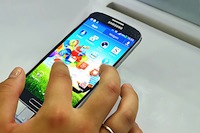
When it comes to choosing a smartphone the most popular options are Android phones and Apple’s iPhone. We see and hear a lot about each of these in magazines and articles online. Most people pose the question which one is the better product to buy? This is often down to a number of factors.
Variety of handsets
The variety of handsets available is limited with an iPhone, so too is the screen size, and location of button. iPhones use Apple’s iOS operating system and are only manufactured by Apple. Whereas Android is an operating system that is used by a number of smartphone manufactures, such as Samsung, Sony, HTC. So with Android, consumers can try out a range of styles, before buying or taking out a contract.
Cost
Android devices are often the cheaper option if you are budget conscious. Apple products are viewed in the technology market as top of the range in function and in style. The price for the latest iPhone models can start at £800, or even higher, whereas Android phones (with lower specs) can be under £100. You can find some cheaper deals online. See our guides to online shopping for a little help.
Apps
The Apple App Store and Google Play Store (which sells Android apps) both have a wide variety of apps to choose from - we’re talking hundreds of thousands. Both offer free apps in many categories. On apps alone, it’s tricky to choose.
Camera and picture quality
The iPhone cameras have fewer megapixels than many Android cameras. More pixels on the whole can equal a more detailed quality photo finish. However with the vast range of photo editing apps available at the Apple App Store and Google Play Store, whichever phone you opt for it’s possible to produce quality pictures. Bear in mind that if you don’t opt for one of the latest models of Android handset or iPhone, the camera equipment or display back properties will be of a lower specification and may not produce your anticipated results.
File sharing
File sharing has become one of the most important functions of a smartphone. As well as being able to share photos and music with friends and relatives, instant file sharing is also really useful if you are at a conference or work event.
Apple’s file sharing feature is AirDrop and Android’s system is Beam. Both are aimed to make the transfer quickly and easy as possible. Both types of phone need to have ‘near field communication’ (NFC) capabilities.
This means you need to be fairly close or in the same room as the person to whom you wish to transfer a file. Their phone would also need the ‘NFC’ feature to be able to receive the file. With iPhone’s AirDrop you can just transfer files literally over the air, to someone else within the same area/room, whereas with Android’s Beam system, you have to be directly by the person who you are transferring with, and your phone has to ‘bump’ (touch) their phone. So Beam transferring seems fun with family and friends, but it might not be appropriate with another delegate at a conference.
Updating apps and features
Both iPhone and Android phones receive updates on a regular basis, these may be to develop features and improve security, not only in the operating systems they use, but also for the preloaded and downloaded apps. Experience has shown that updating occurs more frequently with Android apps than with iPhone apps. Although the rate it happen can vary some, apps may regularly update more than others. Updates are often ignored, but if they are not carried out apps could stop functioning and an Android phone may be more vulnerable to malware.
Security
This is one feature where the iPhone stands out. With all Apple’s iPhones, regardless of the iOS version running, there has not yet been a necessity to download some kind of anti-malware or anti-virus app. And this is maybe where paying a high price for a phone, pays back. It’s a different story for Android. There are regular articles in technology magazines and websites about the malware attacks Android suffers. So when purchasing or leasing an Android phone it is best to get a free antivirus app, such as AVG on the phone as soon as possible.
Lynne Thompson is a Digital Unite tutor, Digital Champion and a tutor-assessor for the Digital Unite Academy.